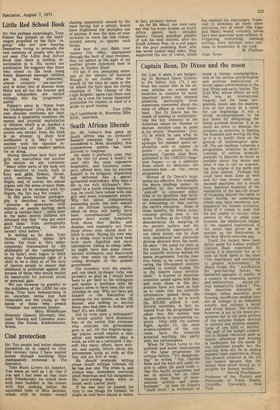Captain Bean, Dr Dixon and the moon
Sir: Lest it seem I am badgering Dr Bernard Dixon (Letters to the Editor, July 17), I say from the outset that in his recent articles on science and medicine in America he made important points that demand attention, particularly from Americans concerned about the state of affairs in their homeland. But Dr Dixon has the knack of missing or misinterpreting the key elements in the American issues he chooses to discuss. Another case in point is his article ' Moonshine '(July 17) in which he uses what he calls "the most threadbare apologia for manned space exploration ever to appear in public" — an article by the astronaut, Captain Alan Bean, published in the UNESCO magazine Impact — as a platform from which to denounce the American man on the moon programme.
Several of Dr Dixon's arguments are effective. For example, the moon landings cannot be justified by the technological ' spin-off ' to consumer industries or by satellites that facilitate communications and weather forecasting or that survey the earth's resources. None of these benefits, Dr Dixon notes, required getting men to the moon. Further, as the USSR has demonstrated, the sampling of the moon's surface and the initial scientific exploration of our sister planet can be done with mechanical and electronic devices directed from the earth. He says: "the quest for man on the moon has in fact distorted the scientific motives behind the space programme, forcing massive funds to be used in fabricating the life-support systems needed to sustain human life in the bizarre lunar environment." A number of American scientists would agree with him, and even those in the programme have not been so rash as to claim that the scientific information gained from the Apollo missions so far is worth the $25,000 million it cost. Several scientists, in fact, resigned from the programme because they felt science was be sacrificed to engineering exploits. Only with the current flight, Apollo 15, the most science-oriented of the ventures, have the scientists achieved anything like parity with the technologists.
When Dr Dixon turns to the political and social implications of the lunar programme his critique falters. "It's disappointing," he writes, "that Captain Bean and his kind still seem unable to admit the stark truth — that the Apollo programme was set in motion for no other reasons than those of international politics and showbusiness." At best Dr Dixon's " stark truth " is irrelevant; at worst a clumsy oversimplification of the serious psychological and political implications of Soviet space achievements in the late 'fifties and early 'sixties. The Cold War, whose effects we still feel, was an international tragedy, but the lunar programme exists and the exploration of the moon as a quest for our beginnings is not a trivial accomplishment to be put down by denigrating the initial political motives. It is as much an error to dismiss the missions as exercises in beating the Russians and waving the flag as it is to justify them on the ground of technological spinoff. The six landings comprise a programme, whatever its shortcomings, of serious scientific purpose: to discover as much as possible about the moon and what it has to tell us concerning the origins of the earth and the solar system. Perhaps this coud have been done as well and for less money with unmanned machines, but it would have deprived mankind of the realization of the age-old dream of voyaging beyond the earth to other worlds, an undertaking which may have enormous consequences for human evolution. Even if it comes to pass that we are unable to occupy other planets in this or other solar systems, the intellectual impact of the manned exploration of the moon may prove as important as the discoveries in the New World centuries ago.
Could the money have been better spent for human welfare? Captain Bean responded by saying it is important for us to look up from earth to the stars "for inspiration and motivation to greater achievement." Dr Dixon thinks this "justification for genuflecting before the tarnished spangles of Apollo, in a country of miserable poverty and malnutrition . . . shows callous insensitivity indeed." Yes, the American statistics on hunger, infant mortality, poor housing, insufficient medical care are an outrage in an industrial society, and indicate a moral and social failure. The trouble, however, is not in the moon programme but in the large portion of the national budget devoted to military and defence expenditures of one kind or another. The part of the budget committed to human resources such as health, education and housing is inadequate for the needs of the American people, but the solution does not lie in ending manned lunar exploration. Given the present situation in the US one cannot assume that the money thus saved would go to projects for human welfare.
Harold Fruchtbaum Professor of the History and Philosophy of Public Health, Columbia University, New York


































 Previous page
Previous page